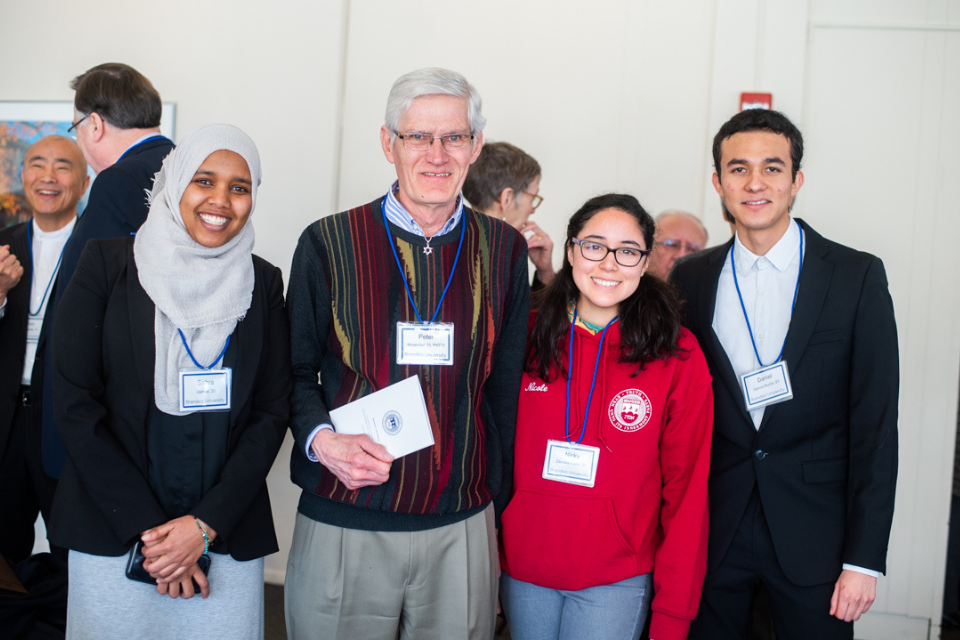Brandeis Alumni, Family and Friends
Brandeis Celebrates 60 years of the Wien International Scholarship Program
March 12, 2019

Brandeis University celebrated the 60th anniversary of the Wien International Scholarship Program over the weekend, bringing together 140 current and former Wien scholars, faculty and friends. The program encourages its scholarship recipients to use their Brandeis education to become engaged global citizens, and since its founding in 1958 by Lawrence A. and Mae Wien, nearly 900 students from more than 110 countries have attended Brandeis.
Organized by a Wien alumni committee with support from the Division of Institutional Advancement and the International Students and Scholars Office, the March 9-10 celebration honored the vision and generosity of the program’s founders by showcasing the scholars’ lasting commitment to Brandeis and to improving the world, long after they leave campus.
The weekend opened with a conversation among current Wien scholars, moderated by Jodi Hanelt, director of the International Students and Scholars Office. Small groups of students shared their perspectives on academic life at Brandeis, the clubs and organizations that are most meaningful to them, what they wish they knew before they came to Brandeis and what it means to be a Wien scholar in 2019.
Yasmin Bedair ’19, a health, science, society and policy major and education minor from Egypt who hopes to become a teacher one day, spoke about the community she found through the Wien program. “Being a Wien scholar today means celebrating our differences. From there, we could find similarities and shared experiences,” she said.
“When I first came [to Brandeis], I was very homesick...But with every Wien event we were able to connect on similar struggles, similar accomplishments, and for that I’m very thankful.”
“Like many of us here today, I would not have been able to attend an elite university in the United States were it not for the wonderfully generous Wien scholarship,” added Sonia Pavel ’20, a philosophy and anthropology major from Bucharest, Romania.
“I came here and I was surrounded by kindness and support and encouragement, particularly from faculty members … to pursue the mission that most of us feel as Wien scholars: to excel as scholars and to find what we’re passionate about.” Pavel plans to pursue a PhD program next year.
Following the student perspectives, a panel of distinguished Wien alumni discussed the achievements of the program over the past 60 years, and how they are continuing to live out the vision of its founders. Vyjayanthi Rao ’89, director of the Terreform Center for Advanced Urban Research, moderated the discussion.
Born to a Chinese family in Mozambique, Isabel Chiu ’82 described her experience attending school in Swaziland to receive a multi-racial education not under Apartheid. It was there she first learned of Brandeis from another Wien scholar that had attended the same school.
“Brandeis was a gateway to excellence in academia, a gateway to freedom,” Chiu reflected. “We don’t need to return to our home countries to make a difference. We need to be engaged citizens wherever we are.”
To current and future Wien scholars, she added, “You play a bigger role than you know. When I was at Brandeis, coming from Southern Africa, what struck me was how much Brandeis needed us. The prospective that Wien scholars offer to Brandeis is enormous.”
Japanese entrepreneur and philanthropist Toshizo “Tom” Watanabe ’73 received the Alumni Achievement Award at a gala Saturday evening. In presenting the award, President Liebowitz praised Watanabe, a former Wien scholar, as a “proponent of cross-cultural understanding” who carried forth the legacy of the Wien program by providing scholarships for students from Japan to attend Brandeis.
In November, Watanabe generously donated $10 million to his alma mater to establish the Toshizo Watanabe International Scholarship Program. The gift was the single largest that Brandeis has ever received from an international graduate.
In receiving the award, Watanabe spoke about the power of education. “I hope that all of us take the wealth of our education, knowledge and experience, and go out into the world and live a life that matters...My goal for the rest of my life is to support students who would not be able to receive a decent education without financial aid. To me, this is what matters.”
The weekend concluded on Sunday with a faculty discussion about the impact of the Wien program in the classroom, moderated by Provost Lisa Lynch and featuring Suleymon Dost, assistant professor of Classical Islam, and James Haber, professor of biology and director of the Rosenstiel Basic Medical Sciences Research Center.
Professor Dost shared, "Diversity does not come just because you wish for it. Inclusiveness does not appear just because you put it in a mission statement. When I had [Wien] students in my classes, all from different parts of the Islamic world, it added so much taste and flavor to the classroom. That's what really matters."






